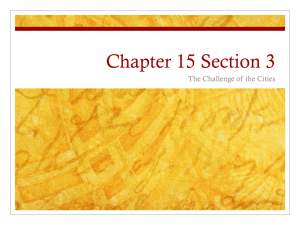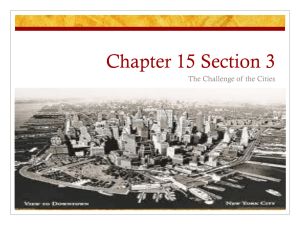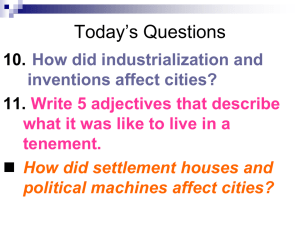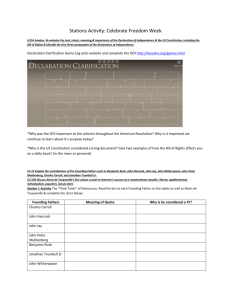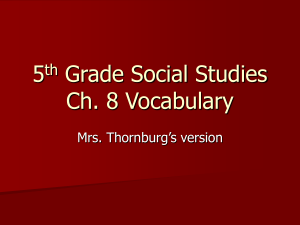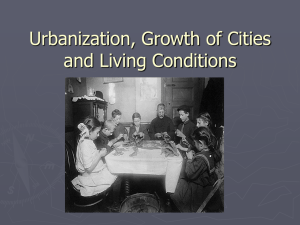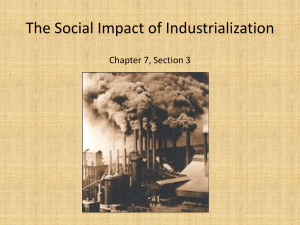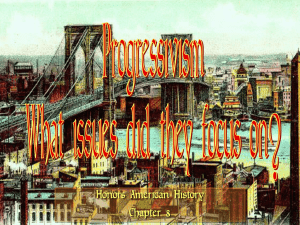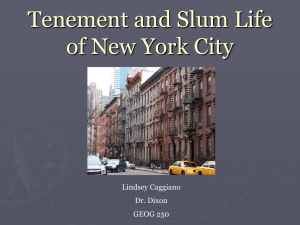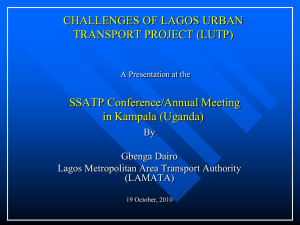Current Issues in Property Taxation
advertisement
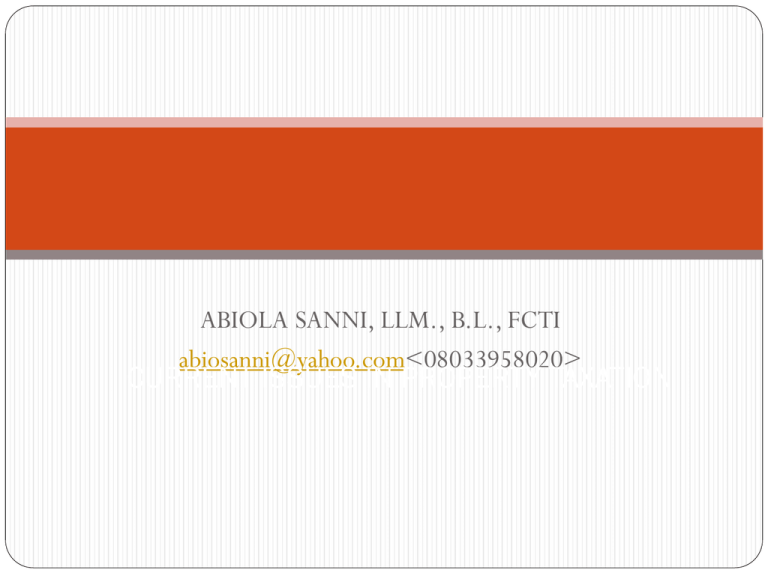
ABIOLA SANNI, LLM., B.L., FCTI abiosanni@yahoo.com<08033958020> CURRENT ISSUES IN PROPERTY TAXATION Outline Definition of Terms Principles of Property Taxation Constitutional basis Land Based taxes in Nigeria Current Issues Conclusionof a federal system Definition of property In a general sense, property is that which is peculiar to anyone: That which belongs exclusively to a person such as money, land, personal chattels or incorporeal (intangible) property. Two broad types of property personal - automobiles, jewelry, furniture, clothing, etc real - means land including whatever is erected or growing upon or affixed to land. Posers What distinguishes the one from the other? Do you think personal property should be taxed? Advance argument for and against. In practice property taxes are narrowly defined due to several considerations verging on policy, law and administration. 1.1. Definition of taxation This is the process of raising revenue for public finance through compulsory payment imposed by government on persons, things or activities for which no direct benefit accrues to the taxpayer. Therefore, payment is not based on the condition that the road leading to the property will be tarred at a particular time or that refuse will be disposed in exchange. This is the bright line rule – No qui pro quo. The name or title given the tax does not matter Poser Is Land Use Charge a tax What of council tax in UK 1.3. Meaning of “current issues” Burning and fresh development or vistas. 2.0. Principles of Property Taxation It is usually a local tax – Does “local” necessarily mean Local Government or State or both? It is a major source of revenue for the local government General public finance – local amenities and infrastructure. Usually imposed on the occupier Limited exemptions 2.1. Constitutional basis See item 1(j) of the Fourth Schedule of the 1999 Constitution which provides: “1. The main functions of a local government council are as follows: (j) assessment of privately owned houses or tenements for the purpose of levying such rates as may be prescribed by the House of Assembly of a State; Please note the following: Limited to “privately owned houses or tenements”. See Shell Petroleum Development Company of Nigeria Limited v Burutu Local Government Council (2000) 1.NRLR, p.1. Tenement is not synonymous with “Property tax” Para 1(j) of the Fourth Schedule is not a direct grant of taxing power to Local government Please note the following: State law is required to establish the framework of tenement rate. In FCT there is no property tax as such but assessment under AGIS in form of fees. This is an aberration. For example, there is no established appeal procedure where a taxpayer is aggrieved. 3.0. Land Based taxes in Nigeria Tenement rate Land Rates Neighborhood Improvement Charge Land Use Charge 3.1. Tenement See generally Tenement Rates Law of Lagos State No. 10, 1989, Cap T2, Laws of Lagos State of Nigeria, 2003. Tenement is “land with building on it which is held or occupied as a distinct or separate holding or tenancy or any wharf or pier but does not include land without building. See section 51 of Tenement Rates Law of Lagos State, No. 10, 1989, Cap T2, Laws of Lagos State of Nigeria, 2003 Tenement contd For a judicial definition see Shell v Burutu Local Government Council (Supra): as “building on land and all other immovable properties which are permanently attached to land but does not include vacant land.” In Shell v Burutu Local Government council. (Supra) The thrust of these definitions is that tenement rate is a tax on immovable property except vacant land. Poser In view of the narrow definition of tenement can a State Government impose tax on other forms of properties? Why not? 3.1.1. Liability to pay Tenement Rates Section 36(1) of the Law places the liability to pay rates on occupiers or subsequent purchasers of a tenement. The real owner, if different from the foregoing, is secondarily liable. Note there is departure from this design under section 4 of the Land Use Charge Law which imposes the obligation to pay on the owner. Posers What is the basis of this in your view? Who bears the obligation to pay is very important when drafting a lease or tenancy agreement where the intention is to shift the burden to the lessee/tenant. 3.1.2. Due Process under Tenement Rate Law Establishment of a Valuation Office, which is charged with the assessment of all rateable properties in the State. Zonal Offices are also provided for each Local Government Area. Thus, there is decentralisation. Zonal offices are the rating authority for their respective areas of jurisdiction. Appraisers The law specifically stipulates that appraisers must be qualified Estate Surveyors and Valuers registered by the Estate Surveyors and Valuers Registration Board of Nigeria. Deal with the assessed value of the tenement. Appraisers contd He is empowered to require any person to give information, which may affect the value of the tenement. He may also call on any taxpayer to produce any accounts, receipts for rent or other documents connected with the valuation of a tenement and to enter into and take measurements and other particulars that may be necessary for the purpose Appraisers contd The Law envisages the reassessment of properties at least once in every five years. Following each assessment or reassessment, the Valuation Office issues a list of the affected tenements and their respective valuation. Appraisers contd Notice of every valuation list or amended valuation list is publicized to property owners in the Official Gazette of the relevant State or in any of the widely read daily newspapers. The notice also gives information as to the place at which the list may be inspected, and allows a period of 21 days for such inspection. In addition to the general notice, every property owner must be given an individual notice showing the current assessed value of his property. Appraisers contd Objection to the Local Government – may be by the owner or occupier. Appeal to the Assessment Appeal Tribunal Posers Regrettably, most of these standard procedures under the TRL are departed from under LUCL. This touches on due process which may render assessment liable to judicial review. 3.2. Land Rates Land Rates are charged under the Land Rates Law of Lagos State. The Law applies to state allocated land and imposes on the owner: Development levy, ground rents, premium, and other incidental rates. 3.3. Neighbourhood Improvement Charge The Neighbourhood Improvement Charge Law applies to private estate or property (developed or undeveloped) designated as an improvement area by the State. A property or estate may be designated as improvement area by the Governor where he is satisfied that: 3.3. Neighbourhood Improvement Charge contd an infrastructure has been provided as by the State government at the public expense or by any agents in a neighbourhood; the quality of a neighbourhood has improved as a result of state government effort; or an estate or developed or undeveloped property or land is neglected or is not being properly maintained. 3.4. Land Use Charge Land Use Charge is payable annually on the value of all real properties situated in Lagos. The Law makes each local; government the collecting authority within its territory. However, section 1(3) provides that each local government may by written agreement delegate the collection of rates and assessment of privately owned houses or tenement to the State. See Knight Frank & Rutley v A.G of Kano State [1990] 4 NWLR (Pt.143) 210. LUCL contd Note that the nature and incidences of the Tenement Rate Law, Neighbourhood Improvement Charge and Land Rates are substantially different. Therefore the argument that the consolidation of the three laws will reduce tax burden is lame. What is more, it is strange for the LUCL which purports to consolidate all the land based taxes not to repeal the pre existing laws. LUCL contd For a discussion of legal issues arising from the LUCL see Prof.Yemi Osibajo, “Property Taxation as a Catalyst for Development – Land Use Charge Law of Lagos State” (2003) Vol. 22, The Journal of Private and Property Law, p.1. Sanni, A.O. “The Controversial Lagos Property Tax” (2003) Vol. 23, The Journal of Private and Property Law, pp.71-92. 4.0. Current Issues Are there really such issues in view of the underdevelopment of property taxation in Nigeria? Current tax reform at the Federal levels has neutral effect on PT. 4.0. Current Issues contd Some States have reformed their property tax – Lagos, Cross Rivers State. What are the developments in Ogun State – participants to share their experience. Is it a sustainable means of local financing? What other forms of local taxation will you recommend? Conclusion Developments in Nigeria have shown that local government tax system is presently too weak to efficiently administer tenement rate. We have to think out of the box on how to optimize this important revenue source in terms of design and structure. I admonish States to be original in fashioning their tenement rate law or property tax law as the case may be. GRATITUDE THANK YOU FOR LISTENING.
